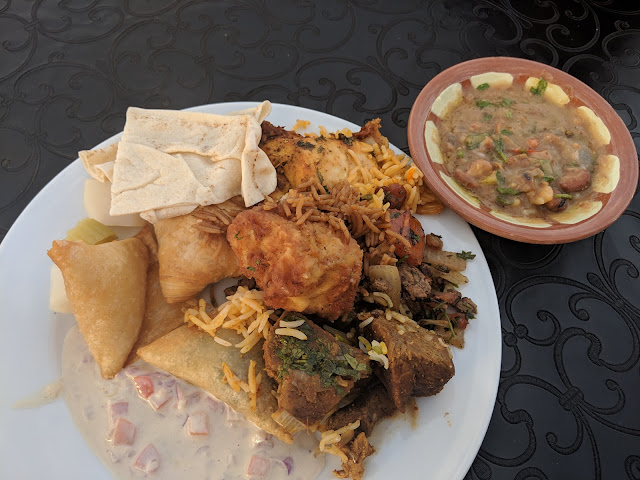I was well aware of Ramadan when we lived 16 years in Saudi Arabia.
It never affected me though. I was a child living in an American compound and
so it never meant more than a month of fasting to me. My father, I’m sure, did
deal with it in the workplace with such things as shorter work hours and a slowing
down of activities.
That’s why I decided to go to the Ramadan Orientation breakfast at
KAUST today. I had been hearing that you can’t even drink water in the presence
of others during Ramadan. What other things would affect my daily life?
The event started with a breakfast featuring some traditional
dishes. There was, of course, fool. Fool is mashed beans that you top with
whatever you like: onions, peppers, yogurt, nuts, herbs, etc. It reminds me a
lot of Chinese congee in the same way you put toppings that you like. There were
dates dipped in chocolate or filled with nuts, omali (a sort of bread pudding),
samosas, kenefe, etc. Drinks included Arab coffee and tea as well as Vimto and
Rooh Afza, which is a Pakistani syrup made from a squash, rose water, and other
ingredients and mixed with water.
 |
| mahmoul - date filled cookies |
We learned about Ramadan being the 9th month of the lunar
calendar. The dates can differ
slightly by where you are in the world, but in Saudi Arabia, it is determined
by physically seeing the first crescent sliver of the new moon. That means if
it is a cloudy night so that the moon can not be observed, Ramadan will not be
proclaimed yet. For 2019, it is scheduled to run from May 6 to June 4.
Ramadan signifies the month that
the Holy Koran was ‘revealed’ to the Prophet Muhammed. Sort of like the Ten
Commandments and Moses. The month is supposed to be a month of reflection and
piety. Fasting takes place as a way to purify one’s heart, soul, and spirituality
and to reflect on God’s word. It is also so that people can relate to the hardships
of the poor and hungry. During this month there should not only be reflection
on oneself, but charitable acts as well. There should be increased peace,
generosity, patience, forgiveness, and charity.
Fasting takes place from sunrise
until sunset, or more specifically, until after the sunset prayer Currently
that’s at about 6:45 PM and will keep getting a bit later as the month
progresses. They practice a dry fast, meaning they can’t even drink anything.
Fasting is not only regarding food and drink, but also smoking and any other
habitual pleasure. It’s like Christians who give up a favorite thing for Lent. It
also includes refraining from impure thoughts, pettiness, or vanity.
People can be excused from fasting,
but not entirely. Basically, if you aren’t fasting due to illness, menstruation,
pregnancy, breast feeding, or travelling, then you have to make up those days
later in the year. Fasting begins at age 10 and goes until they can no longer
fast due to age/illness. In particular, if you have lifelong medication that requires
food/drink, then you will always be off the hook from fasting.
The first meal that breaks the fast
is called Iftar. It is suggested that you start with dates because they have
many nutrients and are somewhat lower on the glycemic index; they won’t
skyrocket your blood sugar as other
sugars/carbs. Supposedly it is a lighter meal, but I’m hearing stories that
people still pork out. The ‘bigger’ meal is Sahoor and takes place between 2-3
in the morning as a way to load up for the next day.
How will this affect me?
- Muslims will work only until 2 PM, the rest of us work normal work hours.
- All food businesses will be shuttered during the day. For non-Muslims, the only place to eat/drink will be the cafeteria, which will be open 24/7.
- You cannot eat or drink in front of others. I plan to fast during Ramadan myself, but I cannot dry fast. I will get a migraine if I get dehydrated. This means I’ll have to bring a bag each morning with a filled water bottle in it and take it into a bathroom stall if I want a drink!
- This will greatly affect our shopping buses to Jeddah as apparently everything stays shut until 9 PM and then will generally stay open until 2 AM! I’m definitely trying to get any last shopping done before May 6 because I’m not interested in those late hours. I just can’t cope without sleep!
- The Iftar and Sahoor meals are family and holiday celebrations. This is when dishes and clothing that you don’t normally see during the rest of the year come out. Think month long Christmas.
- I’ve been wearing a couple of Mideast outfits/dresses that my workmates keep complimenting as my Ramadan outfits. Supposedly it depends on the region of the country, but here in the Hijaz area, these outfits are only worn during Ramadan.
- As for the food, I am hoping that I get invited to someone’s Iftar. They say you should definitely experience it. At the least, there will be Iftar specialty dishes served each night at a couple of the KAUST restaurants. I will try each one for sure.
Unfortunately, I will depart in the middle of Ramadan and so I
will not get to celebrate the end – Eid al-Fitr. That’s when even bigger
holiday celebrations take place and KAUST will shut down for 3-4 days.

.png)



